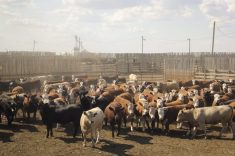The Canadian Federation of Agriculture and supply-managed commodity groups say farmers have had no input on a revised interprovincial trade deal that carries a lot of potential downside for the ag sector.
“The initiative to renegotiate the text was without any prior consultation with affected industry groups,” CFA president Laurent Pellerin said in a release Friday.
The revisions to Chapter Nine of the provinces’ Agreement on Internal Trade (AIT) have effects for “every sector of Canadian agriculture,” he said.
“The CFA is tired of the paternalistic, rather than true partnership, approach by government that they know best. What possible reason could they have not to discuss with industry if they indeed felt it was a good deal?”
Read Also

U.S. livestock: Cattle sink ahead of semi-annual inventory report
Chicago cattle futures fell on Thursday ahead of the USDA’s semi-annual cattle inventory report. Hog futures were mixed. Most-traded April…
The CFA said its legal analysis of the text shows that “despite the (provincial) premiers’ assurances that the legislative powers of orderly marketing boards has been excluded, the actual language is not adequate. In addition, further legal analysis has shown the text does not specifically protect the power for ministerial exemptions.”
The federation and its provincial members have been asking for consultations and language to protect supply management and marketing boards, and have also proposed that the wording and intention related to the protection and maintenance of supply management needs to reflect what was agreed to in the Trade and Co-operation Agreement between Quebec and Ontario.
Now, however, the AIT’s signatories must “ratify the text in their respective jurisdictions, despite providing no opportunity for the agri-food industry to see a copy of the proposed text and comment before approving it yesterday,” the CFA said Friday.
The provincial governments had committed to consult with farmers and industries but “they did not follow up,” Canada’s supply-managed poultry, egg and dairy commodity groups — commonly referred to as the “SM5” — said in a joint release Friday.
“As a result, despite the public assurances of the ministers yesterday, and of the premiers in August or even back in 2007… the text has not changed significantly from the 2008 version and the concerns of Canadian dairy, poultry and egg farmers remain.”
“The concerns we shared with governments about the 2008 text remain with the text published yesterday,” Jacques Laforge, president of Dairy Farmers of Canada, said in the groups’ release.
“Despite the efforts of our members to talk to provincial officials, the officials have refused to hold consultations with farmers and industry about the text related to agriculture and supply management, and they have now approved it.”
Quebec’s farm organization, l’Union des producteurs agricoles (UPA), also blasted the AIT revisions on Friday. “It’s exceedingly distressing to see that our concerns, shared by many consumer groups, have been cavalierly brushed aside,” UPA president Christian Lacasse said in French in a release.













